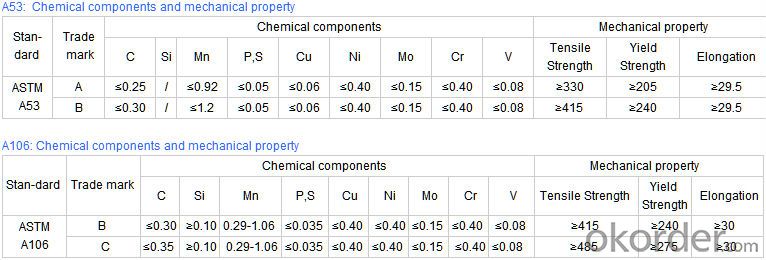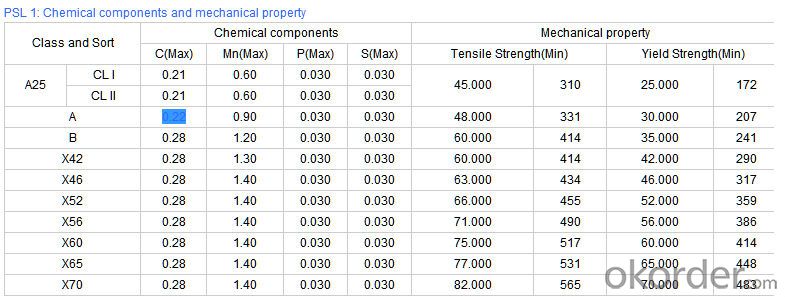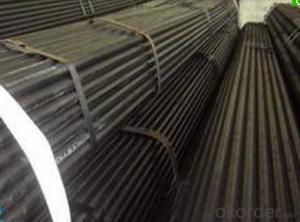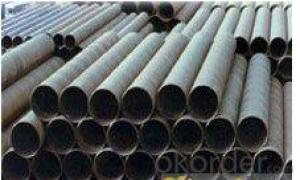Schedule 40 Seamless Carbon Steel Pipe ST52 CNBM
- Loading Port:
- Qingdao
- Payment Terms:
- TT OR LC
- Min Order Qty:
- 10 pc
- Supply Capability:
- 30 pc/month
OKorder Service Pledge
OKorder Financial Service
You Might Also Like
Quick Details
| Thickness: | 1.73 - 59.54 mm | Section Shape: | Round | Outer Diameter: | 10.3 - 914.4 mm |
| Secondary Or Not: | Non-secondary | Application: | Fluid Pipe | ||
| Technique: | Hot Rolled | Certification: | API | Surface Treatment: | Galvanized,vanish covering, black painting, galvenized ect. |
| Special Pipe: | API Pipe | Alloy Or Not: | Non-alloy | Length: | 5-12m as per customer's requirements |
| SCH: | SCH10~160, STD, XS & XXS | Payment Terms: | L/C T/T | Supply Ability: | 5000 Ton/Tons per Week |
| Product: | pipe prices | Grade: | 10#,20#,45#,A106(B,C),A53(A,B),12Cr1MoV,12Cr1MoVG,12Cr2Mo,13CrMo44,13CrMo45,15CrMo,15CrMoG,St52,St52.4,10#-45#,A53-A369,Cr-Mo alloy,ST35-ST52 | Standard: | API 5CT,API 5L,ASTM A106-2006,ASTM A53-2007,DIN 17175,GB 3087-1999,GB 5130,GB 6479-2000,GB 9948-2006,GB/T 17396-1998,GB/T 5312-1999,GB/T 8162-1999,GB/T 8163-1999,API,ASTM,DIN,GB |
Packaging & Delivery
| Packaging Detail: | By bundles, seaworthy wooden cases, steel framed cases, and simple packaging or according to the demand of the customers. |
| Delivery Detail: | within 5-15 days |
Specifications
1.pipe prices
2.Supply Ability:5000 Tons per Week
3.Payment Terms:L/C T/T
High quality Carbon steel pipe, Best pipe prices
1) Application: Overheat pipe for low and mediumpressure boiler,boiling water pipe, locomotive smoke pipe(big and small),Carry gas ,water or oil in the industries of petroleum and natural gas etc
2) Materials: 10#, 20#, 45#, 15CrMo, 12Cr1MoV, 13CrMo44, 12Cr2Mo, 13CrMo45, 12Cr1MoVG, 15CrMoG, API J55, API K55, API N80, API L80, API P110
3)Pipe according to standard: GB 3087-1999, GB/T 8163-1999, GB/T 8162-1999, GB 9948-2006, GB/T 17396-1998, GB/T 5312-1999, GB 6479-2000, GB 5130, DIN 17175, API 5CT, API 5L .
4)Packing: By bundles, seaworthy wooden cases, steel framed cases, and simple packaging or according to the demand of the customers.
Technical Parameters of Seamless Steel Pipe


- Q:Can steel pipes be used for food processing facilities?
- Yes, steel pipes can be used for food processing facilities. Steel pipes are commonly used in the food industry due to their durability, resistance to corrosion, and ease of cleaning. They are also suitable for various processes such as conveying liquids, gases, and solids, making them a reliable choice for food processing facilities.
- Q:What is the average lead time for manufacturing steel pipes?
- The average lead time for manufacturing steel pipes can vary depending on various factors such as size, complexity, and quantity. However, a typical range for lead time is generally around 4 to 8 weeks.
- Q:How are steel pipes used in the manufacturing of pharmaceutical equipment?
- Steel pipes are commonly used in the manufacturing of pharmaceutical equipment due to their durability, corrosion resistance, and ability to withstand high-pressure conditions. These pipes are utilized for various purposes such as transporting fluids, gases, and chemicals within the pharmaceutical production process. They provide a reliable and hygienic method for transferring raw materials, intermediates, and final products. Additionally, steel pipes are often used in the construction of cleanrooms and sterile environments, ensuring the safe and efficient operation of pharmaceutical equipment.
- Q:What are the applications of galvanized steel pipes?
- Galvanized steel pipes have a wide range of applications across various industries. They are commonly used in plumbing systems for water supply and drainage systems due to their corrosion resistance and durability. Additionally, they are used in the construction industry for structural supports, scaffolding, and fencing. Galvanized steel pipes are also widely utilized in agricultural irrigation systems and in the transportation of liquids and gases.
- Q:What is the thermal expansion coefficient of steel pipes?
- The thermal expansion coefficient of steel pipes is typically around 0.000011 to 0.000012 per degree Celsius, which means that for every degree Celsius increase in temperature, the length of the steel pipe will expand by approximately 0.0011% to 0.0012%.
- Q:What are the different methods of inspecting steel pipes for defects?
- There are several methods of inspecting steel pipes for defects, including visual inspection, magnetic particle testing, ultrasonic testing, radiographic testing, and eddy current testing.
- Q:Can steel pipes be used for solar energy systems?
- Yes, steel pipes can be used for solar energy systems. Steel pipes are commonly used for the construction of solar panel mounting structures and the transportation of heated fluids in solar thermal systems. They offer strength, durability, and resistance to high temperatures, making them suitable for various components of solar energy systems.
- Q:Is there any difference between thermal expansion seamless steel pipe and seamless steel pipe?
- One is thermal expansion on a bar, that is, piercing between the bars and expanding the tube with a little bit of mandrel. The other is to expand the formed tube before it is heated so that the defects in the pipe will be enlarged. Comparatively speaking, the quality of the first kind is better than the second, and you should belong to the second kind. Compared with the original seamless seamless tube, the quality and chemical properties are certainly different. The price will be cheaper, too.
- Q:How are steel pipes used in the construction of water treatment plants?
- Steel pipes are commonly used in the construction of water treatment plants for various purposes such as transporting water, carrying chemicals, and handling wastewater. They are often used as the main conduits for distributing treated water throughout the plant, as well as for supplying raw water from the source to the treatment facility. Steel pipes also play a crucial role in the transportation of chemicals used in the treatment processes, ensuring their safe and efficient delivery. Additionally, steel pipes are utilized for the disposal of wastewater and sludge, allowing for proper drainage and disposal systems within the plant. Overall, steel pipes are essential components in the construction and operation of water treatment plants, providing the necessary infrastructure for the efficient and effective treatment of water.
- Q:Are steel pipes suitable for underground sewage systems?
- Yes, steel pipes are suitable for underground sewage systems. Steel pipes are known for their strength, durability, and resistance to corrosion, making them an ideal choice for underground installations. Steel pipes can withstand the pressure and weight of the soil above, ensuring the integrity of the sewage system. Additionally, steel pipes have a long lifespan and can withstand extreme temperatures and environmental conditions, making them a reliable choice for underground applications. However, it is important to note that proper coating and insulation should be applied to steel pipes to prevent corrosion and ensure longevity.
1. Manufacturer Overview |
|
|---|---|
| Location | |
| Year Established | |
| Annual Output Value | |
| Main Markets | |
| Company Certifications | |
2. Manufacturer Certificates |
|
|---|---|
| a) Certification Name | |
| Range | |
| Reference | |
| Validity Period | |
3. Manufacturer Capability |
|
|---|---|
| a)Trade Capacity | |
| Nearest Port | |
| Export Percentage | |
| No.of Employees in Trade Department | |
| Language Spoken: | |
| b)Factory Information | |
| Factory Size: | |
| No. of Production Lines | |
| Contract Manufacturing | |
| Product Price Range | |
Send your message to us
Schedule 40 Seamless Carbon Steel Pipe ST52 CNBM
- Loading Port:
- Qingdao
- Payment Terms:
- TT OR LC
- Min Order Qty:
- 10 pc
- Supply Capability:
- 30 pc/month
OKorder Service Pledge
OKorder Financial Service
Similar products
New products
Hot products
Related keywords






























